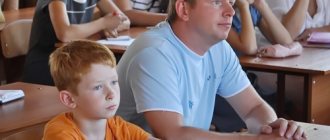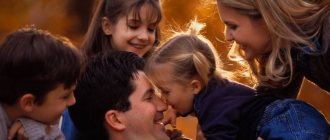What are parent meetings like?
In form, such events can be traditional or non-traditional. The meeting in its traditional form is a meeting of parents with the main speaker - the teacher, as well as representatives of the parent committee or specialized specialists. It allows for joint discussion of current issues, as well as various surveys. The topics of parent meetings in this case are usually standard: “The basics of education”, “Do you know your child?”, “Preparing for school”, “What toys do children need”, etc.
In a non-traditional form, an event can be held in an unplanned situation when there is an urgent need to discuss some serious issue. An informal atmosphere contributes to more successful interaction between teachers and parents, the emancipation of those present, and the establishment of contact.
A non-traditional parent meeting can take place in the form of joint gatherings with tea drinking and even include elements of a story game. It is possible for children to be present together with adults to prepare together for the matinee. It is quite possible to make a parent meeting in the senior group (not to mention the preparatory group) common with the children - they are already quite old.
New school year 2020-2021: Answers to ten main questions from parents
If there is a surge in cases, teachers may be asked to teach lessons like this.
Photo: Shutterstock
Two documents brought novelty to the activities of educational institutions this year: “Sanitary and epidemiological requirements for the structure, content and organization of work of educational organizations and other social infrastructure facilities for children and youth in the context of the spread of a new coronavirus infection (COVID-19)” (SP 3.1 /2.4.3598-20) and recommendations compiled on their basis “On the work of educational institutions”, signed by representatives of Rospotrebnadzor and the Ministry of Education. Both of these regulations only set the framework for school life during a pandemic. How to squeeze into them must be decided locally.
We have collected answers to the most pressing questions for parents about what this new school year will be like.
1. Will the rulers pass - with flowers and the ringing of a bell?
September 1st will be a holiday. And in person! This is what the Ministry of Education promises for schoolchildren throughout the country. But the rest depends on the epidemiological situation in the region and the decision of the administration - the specific area and the specific school.
On September 1, Rospotrebnadzor issued the following order: “... a ban on holding mass events between different classes (schools). Organize festive events on September 1 in classes or parallels outdoors using personal protective equipment (masks) for parents.”
That is, in principle, a small school can organize holiday celebrations in the open air for individual classes: at 8.30, for example, 1st grades are celebrated, at 9.00 - 2nd grades, etc.
But in large schools, where there are 6-8 or even more classes in parallel, crowding cannot be avoided even with this option. Therefore, Moscow Mayor Sergei Sobyanin, for example, immediately warned: there will be no lineups or mass events on September 1. And this is understandable - in the capital, most schools have become educational complexes where thousands of children study.
But in any case, the Day of Knowledge will be celebrated in schools - at least in the classrooms, in their own classes.
2. Do I need to bring a certificate on September 1 that the child does not have Covid?
No, no certificate is required. The Ministry of Education has agreed with the Ministry of Health that for the first two weeks doctors will be on duty in schools to receive children. Temperatures must be measured at the entrance, and if there are signs of acute respiratory viral infection, the child will not be allowed to attend classes.
3. What will change in the classrooms?
Disinfection measures will be strengthened: more thorough cleaning before classes, general cleaning once a week, and antiseptic dispensers will be installed at the entrance and in the toilets. Air disinfectants will appear in classrooms (they must be provided at the expense of the budget; collecting money from parents for these needs is illegal).
Children's school schedules will be adjusted where possible to stagger the start times of classes and avoid morning crowds. For the same purpose, it is recommended to use the maximum number of entrances to the school (and not just one where the guard sits, as is usually the case with us). However, it is prohibited to start classes before 8.00.
4. How will they be seated in the classrooms? One by one? What if the classes are large and there are many children?
The federal document does not require students to be seated in a checkerboard pattern or in a row. The school is only obliged to comply with the previous SanPiN standards, according to which there must be at least 2.5 square meters per student in the classroom. m area.
That is, if your child is lucky enough to study in a new, uncrowded school, not much will change in his classroom life. Except that both middle and high schools will now study in their assigned classrooms, like elementary schools (with the exception of lessons that require special equipment: chemistry, physics, technology, physical education, etc.). But, alas, there are few such unfilled schools. The heads of other educational institutions will have to somehow get out. How exactly will be decided at teachers’ councils, which are taking place throughout the country these days.
5. Are teachers and children required to wear masks?
Quote from the recommendations of Rospotrebnadzor: it is mandatory... “the use of personal protective equipment (masks and gloves) by food service personnel.” (Elsewhere it is indicated that parents of children on September 1 at special events must wear masks.)
There is no mandatory requirement for teachers to wear masks during lessons! But local authorities and sanitary doctors have the right to tighten these measures when the epidemiological situation requires it. And if the coronavirus situation is bad in your area, teachers may be required to protect their respiratory system.
There is no provision in the recommendations for students to wear masks or respirators. But if parents consider it necessary, they can send their daughters and sons to classes, even wearing a respirator. No one will object to wearing them in class.
6. Will there be traditional parent-teacher conferences?
The documents regulating the work of schools and kindergartens say nothing about parent meetings. That is, there is no formal ban on their holding. But maybe epidemic risks will encourage school administrations to leave meetings of moms and dads in the format of video conferences, as happened at the end of last year? At least, this is much more convenient for parents than racking their brains about how to get to school on time from work and where to place their child until the adults resolve all the issues: “Should I buy new curtains for the classroom? The old ones have already gathered dust.”
The same safety measures will be introduced in kindergartens as in schools.
Photo: Maria LENZ
7. What will happen to physical education?
As long as the weather permits, it is advisable to conduct classes outside. If you are unlucky with her, go to gyms, but not more than one class at a time. Even visits to swimming pools are allowed if your school has one. But also strictly by class. And after each lesson, locker rooms must be cleaned with disinfectants.
8. How is food organized, will anything change in the canteens?
The meal schedule should be designed in such a way as to minimize class overlap in the cafeterias. Obviously, this cannot be completely avoided, but most likely, different classes will now have breakfasts (lunches) at different breaks.
Food service employees, as well as other personnel involved in preparing food or setting tables, are required to wear masks and gloves. Moreover, masks must be changed in a timely manner (or the filter in reusable ones must be updated). This also applies to teachers on duty who control order in the canteens.
Dishes should be washed in the dishwasher at maximum temperature. And if this is done manually in a school or garden and it is impossible to use boiling water, you will have to use suitable disinfectants.
9. What happens if a student or teacher gets sick with Covid in the class?
An epidemiological investigation will be carried out in each specific case of the disease. Based on the data from this investigation, sanitary doctors will decide what measures need to be taken to prevent further spread of the infection, Rospotrebnadzor explained to KP.
Including, but not necessarily, we can talk about closing the class for quarantine - just as happens during flu outbreaks, for example.
A child who has recovered from Covid can return to class after the attending physician issues him a certificate about the possibility of visiting child care facilities. This also applies to those who have had common ARVI. That is, being absent due to a note from mom saying “We weren’t feeling well” will no longer work.
10. Are distance learning programs being prepared in case of school closures?
If the epidemic situation worsens, schools are advised to be prepared to switch to distance learning. Moreover, this option is considered as preferable in case of outbreaks of other infections - be it influenza, chickenpox, etc.
Kindergartens are subject to the same requirements as schools. Mass events are prohibited, groups must be kept as separate as possible, and mixing of students from different groups is not allowed.
Sanitary doctors recommend, as in schools, using different entrances to avoid crowding at one gate. Therefore, many kindergartens have printed out fire doors, which in typical modern buildings are found in every playroom or bedroom, and are preparing to use them. Group premises are cleaned with disinfectants, toys are also sanitized regularly. After classes in the gym, music room or swimming pool, these rooms are cleaned before the next group arrives. During walks, mixing different groups is also not allowed: each plays on its own playground.
If there is a surge in cases, teachers may be asked to teach lessons like this.
The same safety measures will be introduced in kindergartens as in schools.



